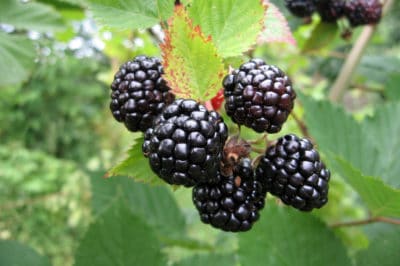A Good Start
Whether you’re planting an entire blackberry patch or one bush in a container, success begins with the soil. More than anything else, blackberries need good drainage.
In the garden, that means sandy or sandy loam soil. If your soil is heavy, plant in raised beds. Working 3 to 4 inches of organic compost into the soil before planting improves a raised bed’s drainage and loose soil’s water retention.
Grow a container blackberry in equal parts of organic potting mix and organic compost. Be sure its pot has several drainage holes.
Fertilizing
Fertilize in-ground blackberries when you see new growth emerging, usually three to four weeks after planting. Scatter 3 cups (.7 liters) of organic, granular 4-3-4 fertilizer for acid-loving plants over every 10 square feet of soil. Water well when you’re done.
After the first growing season, fertilize as soon as the soil thaws in spring and once more within the next six weeks to two months.
For container blackberries, apply a liquid organic fertilizer with equal N-P-K numbers at the label’s recommended rate. Feed when new growth appears and again when it finishes flowering.
Water
Between spring flowering and the end of harvest, most blackberries need from 1 to 2 inches of water per week. Two watering sessions of 30 to 60 minutes via drip system are ideal. No matter how you water, keep the bushes dry or they may attract fungal diseases.
Check container blackberries daily; water if the top 1 inch of soil feels dry. They could need two drinks a day in hot, dry weather.
Mulch
Maintaining 3-inch layer of organic mulch around your berries has several benefits. It:
- Discourages weeds and improves air circulation around the bases of the plants.
- Retains soil moisture, reducing the need for watering.
- Regulates soil temperature.
Expert gardener’s tip: As acid-loving plants, blackberries perform best with an acidic soil pH between 6.0 and 6.5. Pine bark and pine straw mulch release acid as they decompose.
Pest Management
Swollen areas (galls) on the lower 12 inches of your blackberry canes mean cane borers have burrowed in to feed. To eliminate them, cut and burn the affected canes.
Aphid colonies drain sap from the bushes and cover them with sticky honeydew waste. Spray infested plants with organic insecticidal soap sprayed until they drip. Repeat every three days as needed.
